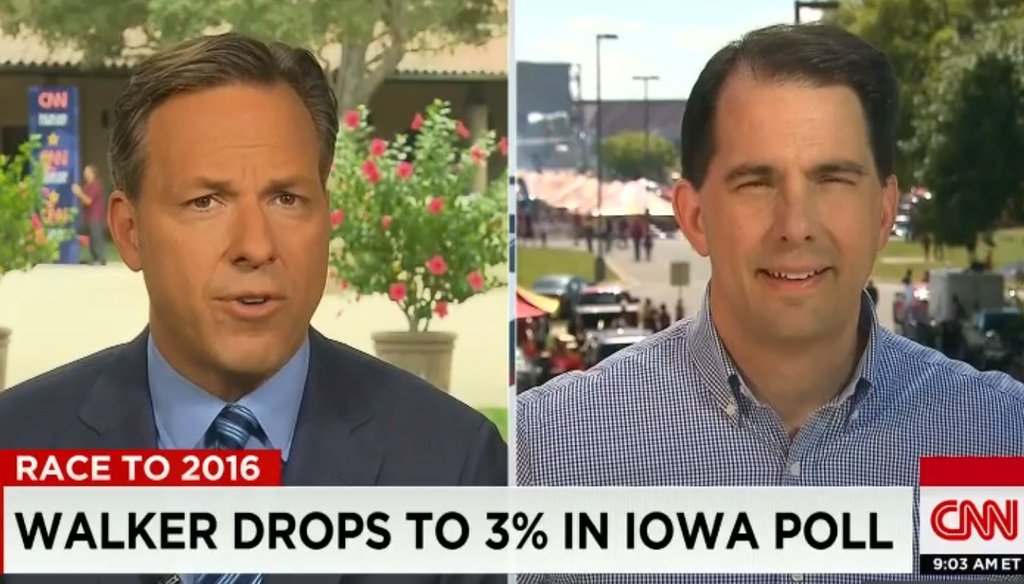Stand up for the facts!
Our only agenda is to publish the truth so you can be an informed participant in democracy.
We need your help.
I would like to contribute

Gov. Scott Walker, R-Wis., talked about his record in an interview with Jake Tapper on CNN's "State of the Union." (Screengrab)
Three days ahead of the second Republican debate, Donald Trump on Sunday found himself in the familiar position of defending disparaging remarks he made about a woman’s appearance.
Trump was asked on CBS’ Face the Nation to explain a Rolling Stone profile that quotes him as saying, "Look at that face! Would anyone vote for that?" in reference to former HP CEO Carly Fiorina.
Unlike the first GOP bout on Fox News, Fiorina will join Trump and nine other contenders for Wednesday’s square-off on CNN.
Trump said his intention was to criticize her "persona," casting attention on Fiorina’s business record.
"She hasn’t done a good job in, you could call it, the private sector. The companies, take a look at the record," he said. "The top man at Yale Law School came out, Jeffrey Sonnenfeld, with just a raging report. She’s one of the worst executives in his memory in history running the company."
Sign up for PolitiFact texts
Trump mangled minor details about Sonnenfeld’s position and what his column says. But Sonnenfeld has been a loud critic of Fiorina’s, so we rate the claim Mostly True.
Trump is likely referring to an Aug. 14, 2015, column in Fortune by Yale’s Jeffrey Sonnenfeld. Sonnenfeld is a professor and senior associate dean for leadership programs at the Yale School of Management -- not "the top man" at Yale Law.
Sonnenfeld didn’t name Fiorina as one of the worst executives in his memory. Instead he wrote how "several leading publications titled her one of the worst technology CEOs of all time" after her firing.
Those caveats aside, Sonnenfeld has been a long-running critic of Fiorina, faulting her for forcing through a "massive, ill-conceived, controversial" merger with Compaq Computer in 2002 by using "hardball tactics that would make Donald Trump wince," cutting 30,000 U.S. tech jobs, and slicing shareholder wealth, among other points.
Beyond that, he has called Fiorina’s tenure at HP a "colossal failure" in Bloomberg, and told the New York Times, "You couldn’t pick a worse, non-imprisoned CEO to be your standard-bearer."
"She was not a criminal nor one of the rogue CEOs of another era and may deserve another chance, but it is telling that in a decade, she has never been given another major company to lead," Sonnenfeld told PolitiFact. "Experience can be a badge of honor or a badge of shame."
A spokeswoman for Fiorina’s super PAC dismissed Sonnefeld as "a Clinton ally with dubious motives."
"This is a blatantly absurd statement which holds no factual or empirical basis," Leslie Shedd, press secretary for Fiorina’s Super PAC, said.
Walker on police investigations
Wisconsin Gov. Scott Walker, who will join Trump, Fiorina and eight more candidates at Wednesday’s debate, appeared on CNN’s State of the Union. Host Jake Tapper questioned Walker about his recent criticism of President Barack Obama being too quiet on the issue of violence against police. In Walker’s view, police should be both supported and held accountable.
"I'm proud to say I'm the only governor in America, the first one and I believe the only one today, who signed a law that says there needs to be an independent investigation any time there's a death of someone in police custody," Walker said.
Walker’s claim rates True.
Walker signed Act 348 on April 23, 2014, months before the August 2014 police shooting of unarmed black teenager Michael Brown in Ferguson, Mo., that sparked calls for such independent inquiries.
The bipartisan law required an investigation of at least two investigators whenever an officer on- or off-duty kills someone. Neither investigator can work for the law enforcement agency that employs the officer involved in the death.
The law was the result of a 10-year effort by one family, said Michael S. Scott, director of the Center for Problem-Oriented Policing and clinical professor in criminology at Arizona State University.
"The push for this legislation in Wisconsin came from a coalition organized by Mr. Michael Bell, the father of a young man shot and killed by police in Wisconsin," Scott said. "Two state legislators, Sen. Gary Bies and Rep. Chris Taylor, took up his cause and sponsored the legislation that Gov. Walker signed. Gov. Walker can take credit for signing the legislation, but it was not proposed by his office."
Several states have introduced similar legislation, including Missouri, New York, Connecticut, California, but none has yet passed.
Our Sources
See fact-checks.
















































